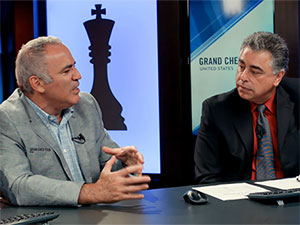Opening advice
Jennifer Shahade: If you were working with Nakamura before this game (round eight with black against Magnus Carlsen), in light of the tournament score, what openings would you recommend for Nakamura…against Magnus specifically?
Garry Kasparov: (Instantly) The King’s Indian.
JS: We were speculating that he might try that again.
GK: You have to play your openings. It’s nothing against the Queen’s Gambit Declined. It’s very solid. I think that for Hikaru to play the Queen’s Gambit, it requires a lot of patience. Also, it’s the preparation: you have to know all the details, and Magnus has played it with both colors. Of course Magnus can play the King’s Indian, but there’s always a chance to complicate things, to create some counterchances. And even if you go down, you will be kicking and screaming. While here, you know, you will be just screaming. (laughs).
Yasser Seirawan: Without the kicking (laughing).
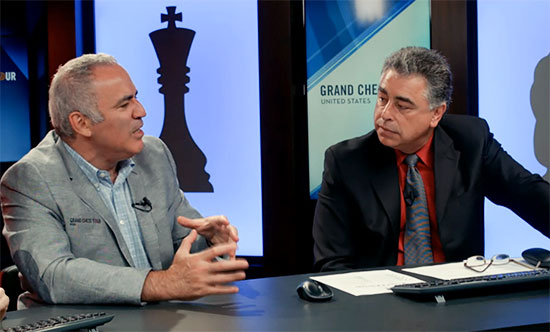
Garry explains that the Queen's Gambit is not ideal for everyone, and requires expert knowledge
in its many subtleties. Perhaps a private class with him?...
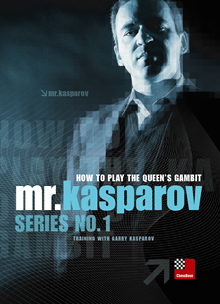 |
Considered by many as the greatest player of all time, Garry Kasparov speaks about variations and ideas of the Classical Queen’s Gambit, the basics of which were laid by the champions of their times – Steinitz, Lasker, Rubinstein, Capablanca and Alekhine.
Even people who don’t actually play this opening will benefit enormously from Kasparov’s explanations, learning from this genius’s vast knowledge of the game and his views on chess history. More than three hours of first-class private tuition.
€29.99 - €25.20 without VAT (for Customers outside the EU) or $28.52 (without VAT)
|
|
Click here to purchase How to Play the Queen's Gambit in the ChessBase Shop
|
GK: I think that the moment the queens are off the board, Hikaru is… less enthusiastic, which is natural because he’s a great player, a tactical player, very resourceful, and positions without queens offer less opportunity for him to show his strengths. You always want to make sure that your strengths will be on display, and you don’t want to play into your opponent’s strengths. This was a mistake I made while playing Kramnik.
About Anand
GK: With all due respect, he is not a young man. He is the oldest player in the Grand Prix and he is 46. He was a World Champion in his forties, while the competition is much younger, I think that tells a lot about his chess ability, his strength. Even with his composure, and his ability to deflect the tension, it’s tough, it’s very tough. He’s competing with young boys who are twenty or more years younger than he is, and there are also all the expectations… it’s tough. We have to give him credit, but 46 is a tough age.
YS: What age did you retire?
GK: I was 41.
YS: Wow.
GK: Yes.
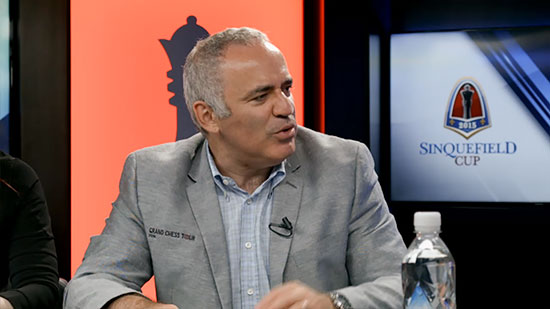
Kasparov tips his hat to Anand, calling him a 'creative force'
YS: So you retired way too early…
GK: That tells you more about the credit you should give to Vishy. For playing and playing so successfully. It’s not so much the success though. Karpov played for quite a long time, but the games were not very educational for professional players. Some tough games that could go on and on, but it was more about Karpov’s technique. Vishy is playing creative chess. There are many games where he comes up with new ideas, so he’s still not just a strong player, one of the top players in the world, he is also a creative force. So you can learn from his games. He’s good with computers, and he’s always looking for new ideas. That’s why when you look at the way he is playing the openings, it’s not just entertaining, but also very educational for other players.
The fall of the Soviet chess armada
GK: In the Soviet Union, chess was a very important factor. A social, cultural, and also political factor. There was a huge investment by the communist state to make sure the great talents were found. That’s why there was the network… Not chess and education, let’s not confuse these two things, but to make sure the talent, from almost anywhere could be noticed and eventually brought into the system, and given the opportunity to realize his or her potential. It is gone with the collapse of the Soviet Union, but it’s happening now in other countries.
(Jennifer and Yasser gesture to indicate the United States)
Absolutely.
YS: like China….
GK: But China is more like the Soviet model. Here in America it’s different, but the game is gaining ground. (…) Now, chess has become a factor. So parents are looking at chess as a potential opportunity for their kids, which means more kids, especially from the Asian families, where the parents are looking for every chance for their kids. This is a country with 310 million people, so there is so much talent, and it creates big opportunity. The moment chess is being considered by 5% of this population…
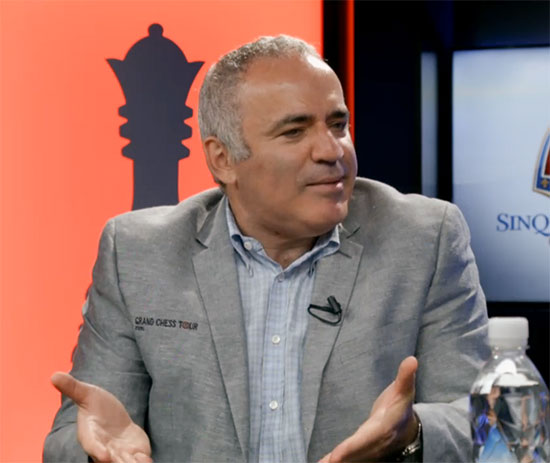
Kasparov noted that England, a force in international chess, currently does not even have
an International Master under 18
YS: …15 million people.
GK: Yes, the advantage of the Soviet Union was that millions of kids went through the network. If you look at the former Soviet Union, one of the most successful countries was Armenia with only 3.5 million people because chess was mandatory in the schools for a few years. And Armenia with such a small population won three Chess Olympiads, Ukraine won two…. And Russia won none since I left the Russian team. So it just tells you that what’s important is not having a massive population like China, it’s about the number of kids that are interested in the game, and parents that would love their kids to have this extra opportunity.
Players from the past
JS: If you could take any player from the past to play in the Sinquefield Cup, who would it be?
GK: Look, Karpov in his prime. He was a very strong player.
YS: (laughs) Yes, he was.
GK: I would say Karpov from 1974-75, when he played Spassky. For fun, Tal from 1959.
YS: Of all your predecessors, who would you like to have dinner with and maybe play a blitz game.
GK: Dinner? Lasker. Blitz? Maybe with young Tal.
